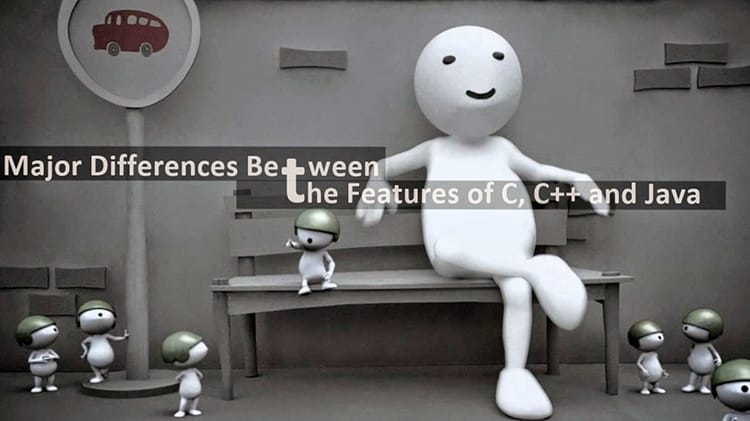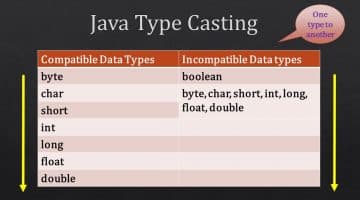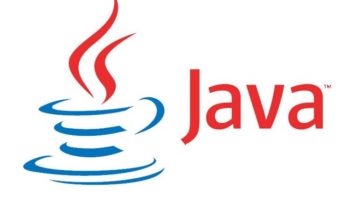Java and C++ both are those programming languages that have changed the world’s perspective towards the IT industry. Both of these programming languages are used in a variety of softwares, applications, gadgets and hybrid machines as well. Both of these high-level level languages help the programmers or developers in many ways. Both Java and C++ support the object oriented approach, yet there are contrasts between them. Not only in the industry, on various freelancing websites, people hire freelancers to get their work done, so if someone is good on any of these languages, he or she can work on freelancing websites easily.
Now we will emphasize the major differences between these two languages below:
1. The principle distinction amongst java and C++ is; Java is platform independent language and it is for the most part utilized for the web based application yet C++ is a platform dependent one and it is for the most part utilized for desktop application.
2. Another difference is that Java is a memory-safe language, on the contrary of it, C++ is not. This implies that errors in Java projects are recognized in characterized routes—for instance, endeavoring a terrible cast or ordering an array outside the allotted boundaries brings about an exception case. Comparative mistakes in C++ prompt to indistinct conduct, where as opposed to raising an exemption or slamming, your program may continue running and crash later or even give the wrong answer or conduct
3. Java has String type and these type of object cannot be modified, whereas C++ doesn’t. The quoted strings are naturally changed over into String objects. Java likewise has a StringBuffer type. Objects of this sort can be altered, and a variety of string control techniques are given.
4. Unlike C++, Java gives true arrays for the top of the line objects. There is a length part, which reveals how large the array is. An exception is raised on the off chance that you endeavor to get to an array that is violating the boundary. All arrays are instantiated in element memory and task of one exhibit to another is permitted. In any case, when you make such a task, you basically have two references to a similar array. Changing the estimation of a component in the exhibit utilizing one of the references changes the esteem seeing that both references are concerned.
5. Despite the fact that C(++) can possibly be more secure than Java (since it is a lower level language), the real security relies on upon the programming abilities and expected endeavors of the programmer. Java has various implicit functionalities to enhance security, but since these unavoidably depend on a brought together framework, it is more helpless against extensive scale and undirected attacks
6. Usually, Java language is taken as a more “robust” language because of the following points:
- Question handles (references) are naturally instated to invalid.
- Handles are checked before getting to, and exceptions are raised in the case of issues.
- You can’t get to the arrays out of bounds.
- Memory breaks are anticipated via programmed garbage collection.
7. In C++, unless you particularly introduce factors of primitive sorts, they will contain rubbish. Albeit nearby factors of primitive sorts can be introduced in the presentation, primitive information individuals from a class can’t be instated in the class definition in C++.
8. C++ requires that classes and capacities be announced before they are used. This is a bit much in Java.
9. The “namespace” issues predominant in C++ are taken care of in Java by incorporating everything in a class, and gathering classes into bundles.
10. C++ requires that you re-announce static information individuals outside the class. This is not required in Java.
11. There are no destructors in Java. Unused memory is come back to the working framework by a method for a garbage collector, which keeps running in an alternate string from the fundamental program. This prompts to an entire host of inconspicuous and critical contrasts amongst Java and C++.
12. Like C++, Java permits you to overload functions. Notwithstanding, default contentions are not bolstered by Java.
13. Dissimilar to C++, Java does not bolster layouts. Therefore, there are no nonspecific functions or classes.
14. Like C++, Java underpins constructors that might be overloaded. As in C++, on the off chance that you neglect to give a constructor, a default constructor will be accommodated you. On the off chance that you give a constructor, the default constructor is not given consequently.
15. Not at all like C++, a few “data structure” classes are contained in the “standard” variant of Java. All the more particularly, they are contained in the standard class library that is appropriated with the Java Development Kit (JDK). For instance, the standard adaptation of Java gives the holders Vector and Hashtable that can be utilized to contain any protest through the acknowledgment that any question is a question of sort Object. Nonetheless, to utilize these holders, you should play out the fitting upcasting and downcasting, which may prompt to proficiency issues.
16. C++ is purely not an OOP as it is possible to code C++ programs without using any class or without declaring an object.
17. There is a “Multiple inheritance feature” available in C++.
18. It involves steeds for courses. C++ is “near the metal”, and most likely the main decision for operating systems and gadget drivers. For projects running under an Operating System, which is just about whatever else.
Summary
Both C++ and Java have their own benefits and drawbacks, but we must accept the fact that these programming languages are highly used in many big and small organizations. Without these programming languages, it would really get hard for the human and machine interaction to happen and as the scientist say, “The world might be close to destruction then.” As many things are now dependent or interlinked with these programming languages. Last but not the least, keep one thing in mind that if you want to hire freelancers for these programming language work, do test their skills and knowledge regarding C++ and JAVA at first.
- Top 6 SEO Tools to Boost Your Business - January 18, 2024
- Top PHP interview questions and answers 2020 - July 7, 2020
- How to create a Whatsapp account using the Australian number? - June 28, 2020




